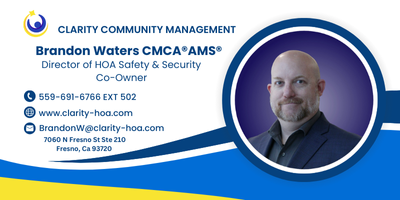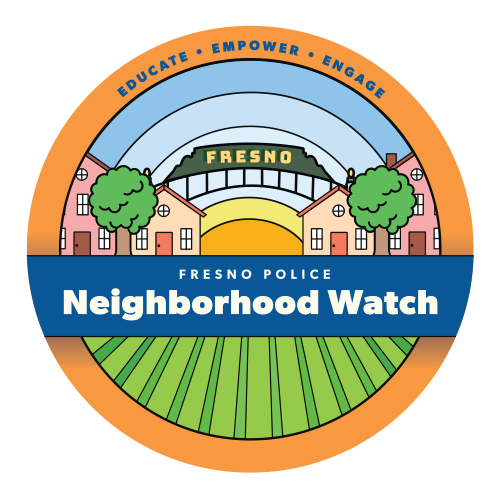
Written by Brandon Waters
Northwest Trustee, Fresno Police and Neighborhood Watch
Homeowners Association Security and Neighborhood Watch
Homeowners Associations (HOAs) are distinctive communities with specific rules and regulations that go beyond those of typical neighborhoods. Some HOAs are gated, while others are not. Many have hired private security patrols, installed surveillance cameras in common areas, and implemented various other safety measures. Despite these efforts to deter crime, it still occurs, which is why following HOA safety and security tips is crucial for all residents. It’s a common misconception that gated communities are inherently safer. In reality, they can sometimes be more attractive targets for thieves, who may perceive them as having more valuable items to steal.
In California, Associations have a duty to exercise due care for the safety of residents and can be liable for their failure to take reasonable steps to protect residents from foreseeable criminal activity.
Per the Davis Stirling Act: (the Association is, for all practical purposes, the Project’s “landlord.” And traditional tort principles impose on landlords, no less than on homeowner associations that function as a landlord in maintaining the common areas of a large condominium complex, a duty to exercise due care for the residents’ safety in those areas under their control.
As concluded above, the Association and the Project’s residents also stand in a common law relationship, similar to that of landlord and tenant, that requires the landlord to exercise reasonable care in protecting tenants from criminal activity.
.. the Association owed a duty to plaintiff to protect her from the foreseeable criminal acts of others. (Frances T. v. Village Green.)
Foreseeable Acts. Even when there is a special relationship between the parties, a duty to take affirmative action to control the wrongful acts of a third party will be imposed only where such conduct can be reasonably anticipated. The scope of the duty is determined in part by balancing the foreseeability of the harm against the burden of the duty to be imposed. In circumstances where the burden of preventing future harm is great, greater foreseeability is required; where the burden is relatively low, a lesser degree of foreseeability may be required. (Wentworth v. Sierra North Village HOA; internal cites and quotes deleted.)
On the flip side, residents are responsible for their safety and should take all reasonable steps to provide for their safety so long as it is within their association’s governing documents. This should include locking your doors and windows in your home and car at all times, not leaving valuables or gate access remotes/key cards in your vehicle, and not posting on social media that you are out of town. This can also include installing your own surveillance cameras where allowed by your association, following HOA safety and security tips, or starting a neighborhood watch group.
Neighborhood Watch groups, such as those organized by Fresno Police and Neighborhood Watch, offer a limited number of free signs to active groups and often handle the installation. The only approval required from the HOA Board is for placing these signs in common areas or on HOA-owned property. If this poses a problem, signs can be installed on city poles near the entrance or exit points of your community, provided it is allowed by the city or county. Permission would also likely be required before placing a sign on your home or property.
What if my management company or Board is against Neighborhood Watch?
There should not be any reason why a neighborhood watch group would be discouraged. A group consists of neighbors who look out for each other and build trust and communication to combat criminal activity and create a better, safer neighborhood. There is generally no cost to this, and any meetings or activity is 100% voluntary. There is plenty of available data to suggest that neighborhood watch groups reduce crime, and when combined with HOA safety and security tips, they can further assist law enforcement in making communities safer. There is no need for an HOA Board of Directors or management company to be involved in the implementation or management of a neighborhood watch group. Although an HOA could become more involved and even create a safety committee for their association, it is not necessary in most cases.
Is my HOA responsible for protecting me from criminal activity?
While associations may elect to employ safety measures in the community such as patrols, cameras, or gates; it should be clearly stated by your association that these measures are not meant to protect residents from crime. There is no guarantee of protection and anything an association does implement is merely a courtesy. Whatever physical security features that exist should be adequately maintained regularly however and communication should be made to residents when there is an issue relating to a feature being temporarily out of service.
What if I want to install lights or cameras on my home?
In HOAs, you need to submit an architectural request form for something like this. Associations can deny installation based on aesthetics or privacy concerns however this should be carefully weighed by the board. Unless the camera had a view of a neighboring property without their consent or lighting would unreasonably disturb the rights of a neighbor, the association could be held liable if the homeowner becomes the victim of a crime after having their request denied. Common areas are public spaces and there is no expectation of privacy in an outdoor common area.
Top Ten HOA Safety and Security Tips
- Don’t assume you are safer because you live in an HOA or gated community. Take steps to protect yourself from being a victim.
- Do not leave gate remotes, key cards, or garage remotes in your car unless in a secure garage. Thieves typically take these to allow for easy, unhindered access later.
- Always lock all doors and windows and set your alarm. Often times residents of gated communities feel more relaxed and leave their vehicles or homes an easy target for would-be thieves.
- If you are the victim of a vehicle burglary, file a police report. It is highly recommended that you freeze your credit report by contacting each of the three credit bureaus. It has been common for vehicle burglary suspects to obtain personal information during a break-in and use it for identity theft and fraud.
- Be aware of your surroundings and try not to let unknown vehicles or people follow in behind you after opening a gate.
- If you have a gate code, avoid giving that code out to people that you do not know if possible (i.e. food delivery drivers)
- When going on vacation or out of town, avoid posting about it on social media until you are back. Notify a trusted neighbor who can keep an eye out for unwelcome visitors. If you have a community security patrol, advise them that you will not be home and ask them to also keep an eye out.
- Maintain a clean and well-lit property to avoid any perception of a vacancy.
- If you are in the process of selling your home or attempting to rent it out, be careful how and where you advertise the home and inspect it as often as possible to avoid the potential of a squatter taking up residence in your home.
- Get to know your neighbors and start a neighborhood watch group! HOAs are perfect for neighborhood watch. Establish communication within the HOA and expand to communicating with adjoining neighborhoods about crime trends or suspicious activity.
Author and post sponsored by Clarity Community Management

